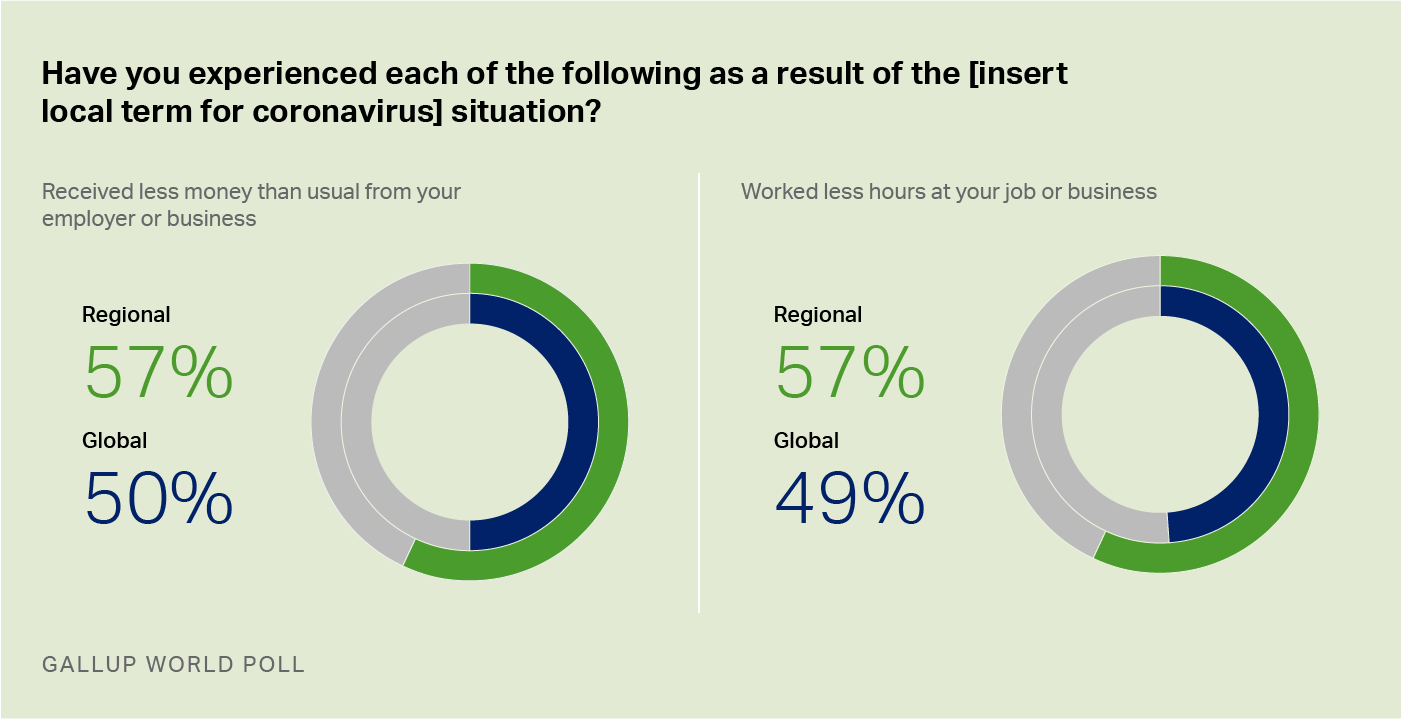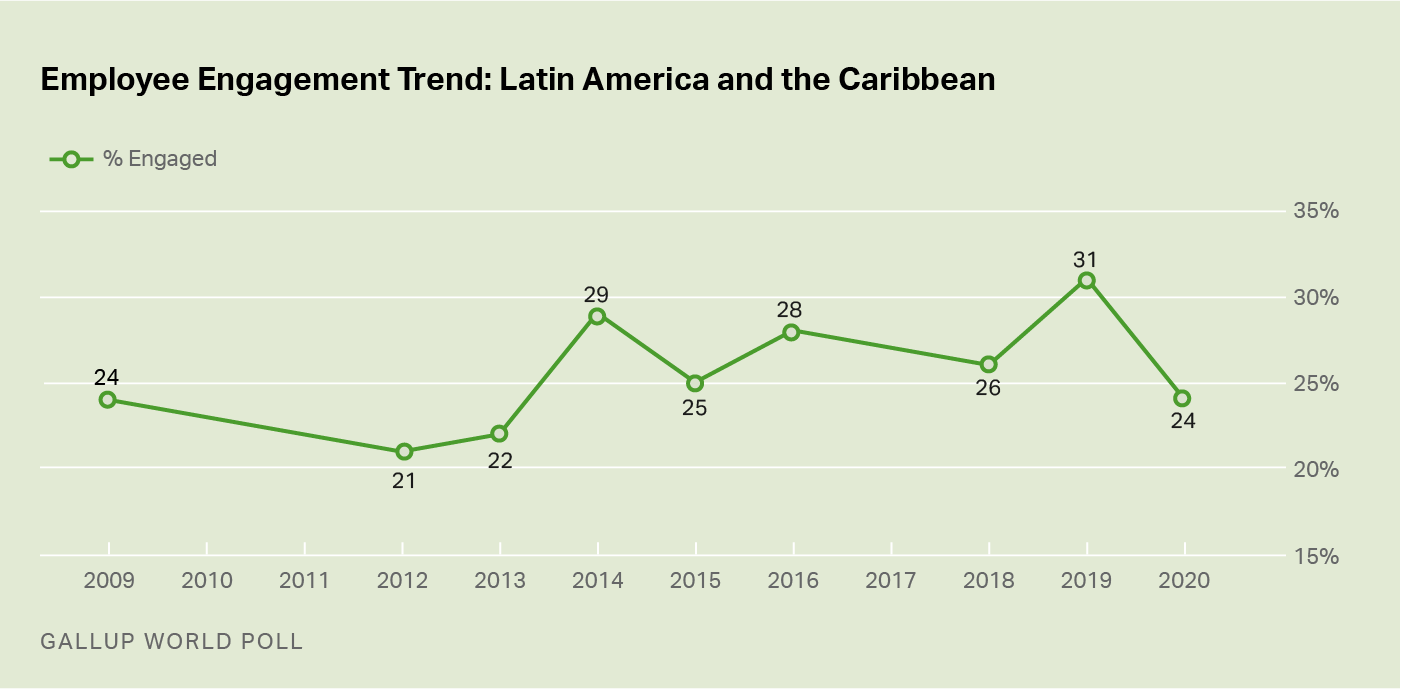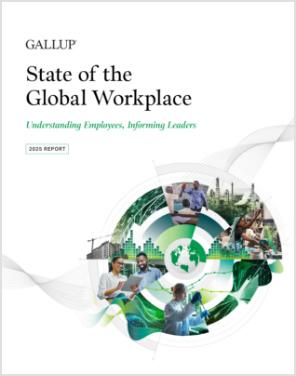Story Highlights
- Gallup released its "State of the Global Workplace: 2021 Report"
- COVID-19 led to lost pay and fewer hours worked in the region
- Leaders can improve employees' engagement and wellbeing
COVID-19 not only changed the workplace, but it also changed the world.
Gallup's most recent data show that the coronavirus situation affected 80% of people's lives globally at least "somewhat," with 45% saying it affected their lives "a lot." A great deal of the impact of COVID-19 was economic: Whereas 32% of people who were working at the time of the pandemic say they lost their job or business as a result of the pandemic, 50% claim to have received less money than usual from their employer or business because of COVID.
In this respect, Latin America and the Caribbean are no exception to the global trend. According to Gallup's State of the Global Workplace: 2021 Report, 45% of adults in the region say their lives have been affected a lot by the pandemic, and the percentage of workers who have lost a job or business (31%) mirrors the global average. Over half of those working at the time of the pandemic in Latin America and the Caribbean have lost pay (57%) and worked fewer hours (57%), while 58% say they temporarily stopped working.
Not only did COVID-19 put a strain on the region's formal economy, but it also put the informal sector -- which accounts for about half of all jobs in Latin America and the Caribbean -- against the ropes. According to the Center for Strategic and International Studies, estimations for real GDP contraction centered around 8.1%, higher than any other region in the world. But unlike other economic regions, the limited growth projections for 2020, coupled with the economic and social hardships brought about by the pandemic, created a perfect storm in the area.

Custom graphic. In Latin America and the Caribbean, 57% of employees say they have received less money than usual from their employer because of the pandemic, and 57% say they have lost a job or their business.
Engagement in Decline
As the economy shrank, employee engagement declined by seven percentage points -- all the way back to 2015 levels -- to 24%. From Mexico to Argentina, almost every country in the region -- with some exceptions in Central America and the Caribbean -- saw the world's worst setbacks in employee engagement.

Custom graphic. 24% of employees in Latin America and the Caribbean are engaged. This latest reading shows that engagement has declined to 2015 levels.
One possible explanation may be the sudden shift to a work-from-home arrangement. Many leaders were not equipped to manage their teams remotely; failed to provide the necessary materials, support and expectations; and lacked the skills to effectively deal with the complexity of juggling their personal work-life balance, as well as that of their employees. In other cases, the infrastructure to effectively implement remote working was not there, such as proper internet connection, platforms and other IT requirements. Alternatively, it may also be a reflection of overall misery. Gallup found that in Latin America and the Caribbean, 61% of employees are categorized as struggling or suffering in their daily lives.
It may be no surprise, therefore, that workers in Latin America and the Caribbean have the highest rates of worry in the world -- 55%, compared with the global average of 41%.
What may come as a surprise, however, is that younger workers are far more optimistic than older workers.
Experiences Differ by Age
This is surprising because younger workers in Latin America and the Caribbean report a heavier burden of economic concerns. Though younger adults were about equally affected by the coronavirus situation (46% of those aged 40 and older said their lives were affected a lot, as did 45% of those younger than 40) and were equally likely to say they'd lost pay (57% of both age groups did), employees younger than 40:
- lost a job or business at a higher rate than those aged 40 and older (33% vs. 28%)
- experienced a great deal more daily stress than those aged 40 and older (52% vs. 44%)
- were slightly more likely than those aged 40 and older to have temporarily stopped working (59% vs. 57%)
So, although Gallup finds that employees' overall life evaluation in the region is down seven percentage points from 2019, it's somewhat promising that younger workers are thriving at a much higher rate than older ones (43%, vs. 34% of those aged 40 and older) and suffering at a much lower rate (3%, compared with 10% of those aged 40 and older).
Though the rate of suffering among older generations is alarming, younger workers' experience should be read as auspicious. Never in its recorded history has Latin America and the Caribbean had such a large proportion of young people -- the region's median age is 31, which means the millennial and Gen Z age cohorts have enormous influence over their companies just from sheer size.
Although Gallup finds that employees' overall life evaluation in the region is down seven percentage points from 2019, it's somewhat promising that younger workers are thriving at a much higher rate than older ones.
The fact that younger Latin Americans -- who are beginning or in the thick of their professional lives -- have so much hope has the potential to change the shape of the region's future. And there's much leaders can do to help.
Spur Development by Shifting the Traditional Managerial Approach
In hard-hit Latin America and the Caribbean, leaders may not be able to bolster workers' hope with higher pay or advancement, but our research shows that leaders who clearly communicate their plans and strategies strongly affect employees' perceptions about the future. But nothing improves workers' outlook like being engaged.
The most important factor behind employee engagement is the manager. But most managers aren't prepared to see to the 12 elements necessary for engagement -- the managerial approach in Latin America and the Caribbean tends toward paternalistic or command-and-control leadership -- nor to develop workers properly. Shifting from a figure of "boss" to a role of "coach" is a culture change that often requires a mandate from leadership. Regardless of the circumstances, this shift is possible.
The fact that younger Latin Americans -- who are beginning or in the thick of their professional lives -- have so much hope has the potential to change the shape of the region's future.
Where to start: Gallup's first recommendation is to change the paradigm of how businesses -- and, consequently, people -- strive for excellence, starting with using and developing talent. A new focus on strengths fundamentally changes how people interact with each other and provides the right conditions for collaboration, even in a remote setting. Developing talent may be a culture change, but it pays off.
- Younger workers say the opportunity to develop is a chief concern in a new job.
- Coaching employees' CliftonStrengths can increase sales by an average of 10% to 19% and profitability by 14% to 29%.
- Workgroups that receive strengths-based development achieve up to a 19% increase in sales and 72% lower attrition.
- Individuals who apply their strengths daily are six times as likely to be engaged at work, six times as likely to strongly agree that they have the opportunity to do what they do best every day -- and, more importantly, are three times as likely to report having an excellent quality of life.
Given the regional wellbeing picture -- where 61% of employees are categorized as struggling or suffering in their daily lives -- helping each person discover what they are naturally good at and positioning them to apply those talents productively will bring a positive impact at the micro and macro levels.
Next step: Gallup's second recommendation is to increase not only the quantity but also the quality of conversations between managers and employees. The topics will vary, but managers should always set expectations, clear obstacles, create accountability and demonstrate caring.
A manager's regular, meaningful feedback has a measurable effect on engagement and performance. But in this economic downturn, in which managers face increased pressure to hit their objectives, command-and-control management will further damage engagement and undermine people's sense of hope for the future.
A manager's regular, meaningful feedback has a measurable effect on engagement and performance.
Even before the pandemic, employees (particularly the younger generations) demanded development from their immediate supervisors -- not employee manuals -- and a clear set of expectations. These conversations must help employees feel inspired and motivated to do better work.
This is the motivation that the people of Latin America and the Caribbean need to set them up for success both inside and outside the workplace and to fuel their sense of hope.
The Optimism of the Young
And being hopeful is a very good attitude to have. Hope builds resiliency and is the wellspring of innovation. Gallup finds that employees who strongly agree that their leader makes them feel enthusiastic about the future (Gallup's measure of hope in the workplace) are 69 times more likely to be engaged in their work compared with employees who don't feel hopeful. Hope builds strong and prosperous organizations.
This time of economic hardship is, ironically, the perfect time to invest in employees' hope. Economists predict economic growth in Latin America in the near future and greater international competitiveness, especially in professional services, IT and risk management. Though the "blue economy" -- the sustainable use of ocean resources -- is a smart bet for economic diversification and growth in the Caribbean, many nations in the region are already broadening their economic base beyond tourism.
Inevitably, this will exert pressure on the demand for better managers. Young people have been leading that charge since before the pandemic -- and they're starting to move into leadership roles. Their numbers and the region's economic decline make younger workers' call for better, more modern management increasingly justified.
And as Gallup studies show that engaged workers are 18% more productive and 23% more profitable than less engaged workers, anything a business can do to support young workers' engagement affects their bottom line. But giving them a reason to hope will shape the future of Latin America and the Caribbean.
Create a high-engagement culture and learn more about Gallup's findings:
- Learn how we help organizations everywhere improve employee engagement.
- Sign up for a webinar to learn more about global workplace trends from a Gallup expert.
- Create resilient teams and organizations by enhancing employee wellbeing.







